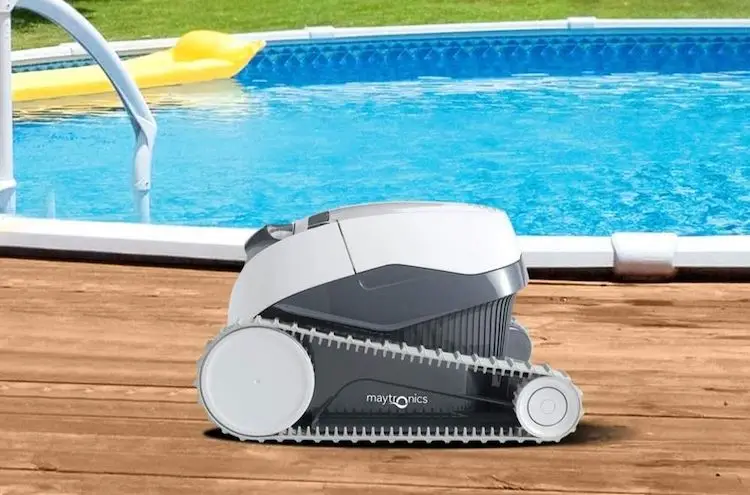A pool vacuum is a manual cleaning tool used for spot-cleaning debris, whereas an automatic pool cleaner is an automated tool used to clean the entire pool floor. Both are effective in their respective functions.
Discover the Pros and Cons of Pool Vacuum vs Automatic Cleaner – Which Is Best for Your Pool? Get Expert Insights Here!
Swimming pools are a great way to relax and cool off in the heat of summer. However, maintaining a pool can be time-consuming and labor-intensive, especially when it comes to regular cleaning. Many pool owners invest in pool cleaning tools like pool vacuums and automatic cleaners to minimize the time and effort required for pool maintenance.
While both tools have the same purpose of cleaning the pool, they differ in the way they work. In this article, we’ll discuss the differences between pool vacuum vs automatic cleaner, which will help you choose the right one for your pool cleaning needs.

Understanding The Differences Between Pool Vacuum And Automatic Cleaner
Pool vacuum and automatic cleaner serve the same basic purpose, i. e. , to keep the pool clean and hygienic. These machines remove dirt, debris, and other contaminants from the water, making swimming crystal clear and healthy. A pool vacuum is a manual device that connects to the pool filtration system to suck up debris from the pool floor and walls.
On the other hand, an automatic pool cleaner is a self-contained robotic device that operates independently from the pool system. It navigates around the pool floor, walls, and waterline, scrubbing and cleaning dirt and debris. In terms of efficiency and performance, an automatic pool cleaner is quicker and more effective than a pool vacuum but slightly more expensive.
Ultimately, it’s up to the pool owner to decide which machine best suits their pool’s needs and budget.
Pool Vacuum: How Does It Work?
A pool vacuum is a device that uses suction to suck up debris from the bottom of a pool. It consists of a long hose, a head, and a debris collector. Pool vacuums manually attach the hose to the vacuum head and insert it into the pool.
The vacuum’s suction power pulls in dirt and debris, filtered through a mesh bag. The benefits of using a pool vacuum include increased water clarity, a reduced risk of algae growth, and a longer lifespan for pool equipment.
Several types of pool vacuum cleaners exist, including robotic, suction-side, and pressure-side models. Each type has its own unique features and benefits. To ensure the proper operation of a pool vacuum, it is essential to use the correct techniques.
These include maintaining proper water balance, cleaning the filter regularly, and operating the machine correctly.
Automatic Cleaners: How Do They Work?
Automatic pool cleaners utilize a unique functionality to clean your pool without manual labor. Among the advantages is their high efficiency, effective dirt removal, and the ability to scrub pool surfaces. Some popular types are the robotic, pressure, and suction cleaners, each with a specific use.
Maintenance and usage tips include emptying filters regularly, removing and cleaning brushes, and checking for worn or broken parts. Designed to simplify and advance your pool cleaning, automatic pool cleaners are a valuable asset for pool owners.
Key Differences Between Pool Vacuum And Automatic Cleaner

Pool cleaning is of utmost importance to keep your pool clean and healthy. Two such options are pool vacuum and automatic cleaner. Understanding their basic principles and comparing installation and operating costs is crucial to choose the right one. In terms of cleaning coverage and effectiveness, both have their own pros and cons.
However, factors like pool size, shape, and type of debris should be considered for the right choice. Pool vacuum requires manual operation, while automatic cleaner is a more hands-free option. Choose the one that fits your needs and budget.
Maintenance And Upkeep Of Pool Cleaners
Sustaining pool cleaners is crucial for maintaining optimal swimming pool conditions. These tips increase the longevity of pool cleaners. First, inspect the devices regularly to identify possible faults or damages. Second, go through the manufacturer’s cleaning guidelines and perform the maintenance processes.
Third, switch off the power supply before cleaning or repairing to reduce electrical hazards. Check for broken parts or loose connections in case of a malfunction and address them promptly. Finally, handle the cleaning equipment with care to avoid mishaps and injuries.
Taking note of these measures ensures that the pool cleaners function efficiently for a longer duration.
FAQs For Pool Vacuum Vs Automatic Cleaner
What Is A Pool Vacuum And How Does It Work?
A pool vacuum is a manual cleaning device using a hose and suction to remove dirt and debris from the pool floor. It requires manual handling and doesn’t run on its own.
What Is An Automatic Pool Cleaner?
An automatic pool cleaner is a self-operating device that helps clean the pool. It uses a pre-programmed algorithm to navigate through the pool and pick up the debris.
What Are The Advantages Of Using An Automatic Pool Cleaner?
There are several advantages of using an automatic pool cleaner such as it saves time and effort, automates the cleaning process, and is more effective in picking up debris.
Which Is More Effective In Cleaning, Pool Vacuum Or Automatic Cleaner?
Automatic cleaner is more effective in cleaning as compared to pool vacuum as it operates on its own and uses a more advanced technology that provides a deep and thorough cleaning.
Can An Automatic Pool Cleaner Replace The Need For Manual Vacuuming?
Yes, an automatic pool cleaner can replace the need for manual vacuuming as it provides effective and efficient cleaning on its own, without requiring any manual intervention.
How Often Should An Automatic Pool Cleaner Be Used?
It is recommended using an automatic pool cleaner at least twice a week to maintain the cleanliness and hygiene of the pool. However, it also depends on the frequency of use and environmental conditions.
Conclusion
After analyzing both the pool vacuum and automatic cleaner, it’s clear that each has its own unique benefits and drawbacks. The pool vacuum provides a hands-on cleaning experience that can deliver a more thorough clean, with the added convenience of being able to reach tight spaces.
On the other hand, the automatic cleaner offers an effortless approach, making it the perfect option for busy pool owners. Moreover, the automatic cleaner has various features, such as remote control, adjustable cleaning settings, and programmable timers, offering enhanced flexibility and convenience.
Regardless of which option you choose, maintaining a clean pool is crucial, not only for aesthetic reasons but also for the health and safety of swimmers. Ultimately, choosing between a pool vacuum or an automatic cleaner comes down to personal preference, available time, and budget.
Be sure to consider all the pros and cons before deciding to suit your needs best and follow us on House Stopper: Company Page





